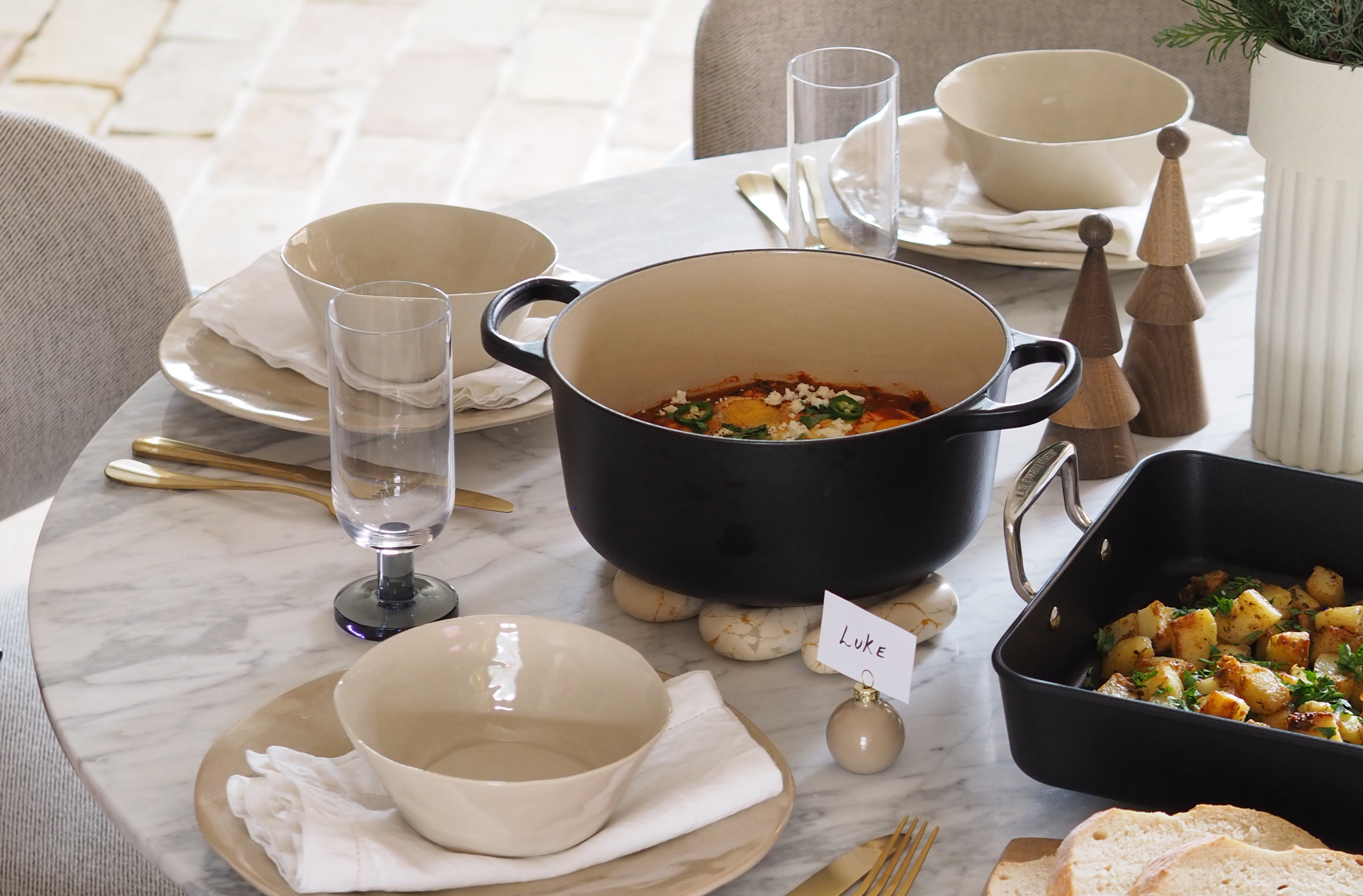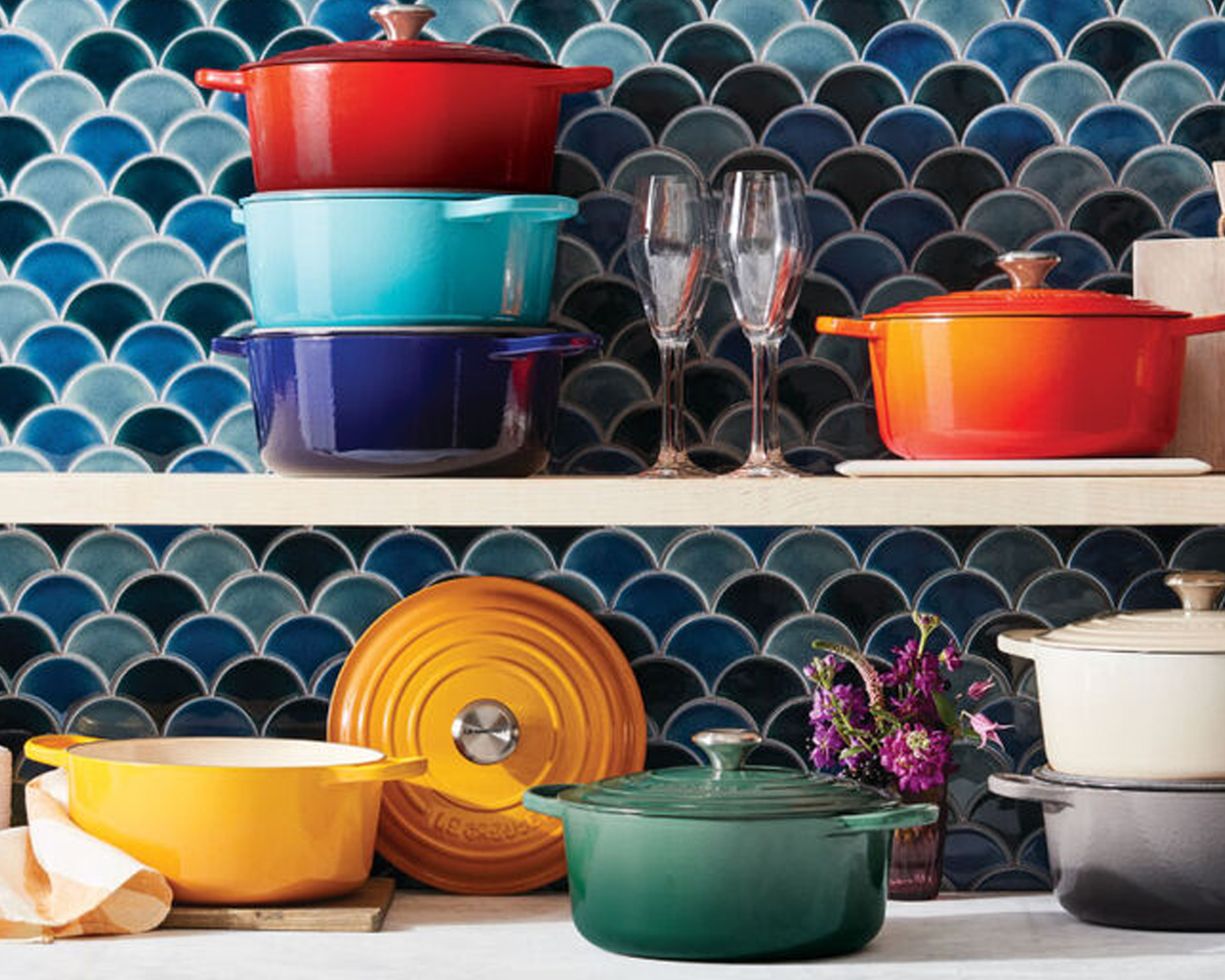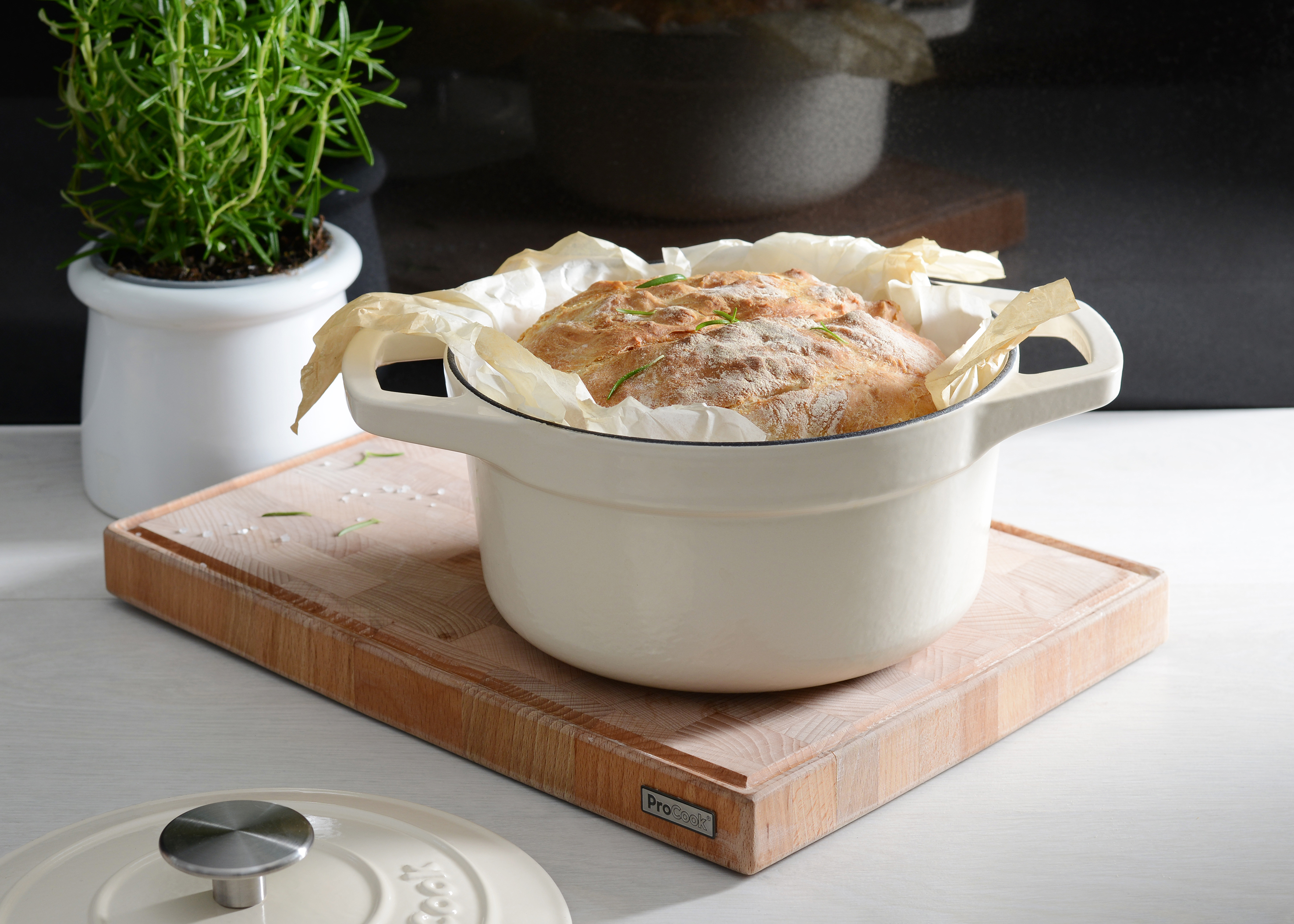Should you invest in cast iron cookware? Here are some pros and cons
Cast iron cookware is durable, look-lasting and multifunctional, but is it worth the investment? Here's what the experts have to say


The Livingetc newsletters are your inside source for what’s shaping interiors now - and what’s next. Discover trend forecasts, smart style ideas, and curated shopping inspiration that brings design to life. Subscribe today and stay ahead of the curve.
You are now subscribed
Your newsletter sign-up was successful
How much did you envy your Grandmother's cast iron cookware growing up? The familiar sight of steamy saucepans on the stove in bright, bold colors is one of those nostalgic memories many of us share. A similar sight in adulthood is instantly reminiscent of home comforts. But if you haven't inherited those hand-me-downs (trust us, they last forever), is cast iron cookware worth the investment?
If you're anything like me, the older you've become, the more you've learned to appreciate good quality kitchenware. Cast iron pots, pans, and dishes are a reliable staple in so many households, and for good reason. They're versatile, durable, long-lasting, and have incredible heat retention compared to other materials in the kitchen. And yet, there are certain rules when it comes to cleaning them you'll need to get your head around, as well as some directions as to what you can and can't cook in them.
To help you decide if cast iron cookware is the right investment for a modern kitchen, we've asked some experts in the know why they think it's a worthy contender for your kitchen Christmas list (or your pay-day splurge). Here's what they had to say.
Why should you invest in cast iron cookware?
1. It has great heat retention

Not only does cast iron cookeware look right at home in a rustic farmhouse kitchen, but one of the biggest advantages it has from a practical perspective is its ability to retain heat. Unlike finer-material pans like aluminum or copper, the heat level doesn't fluctuate with cast iron so it's a great option when you're cooking with high heat. Since cast iron pans are so thick, you'll probably notice that your pans take longer to heat up on the stove, but once they're hot, they stay hot!
'Cast Iron’s heat retention qualities make it a joy to cook with, removing the need for high temperature settings and helping you to preserve energy and cook more efficiently,' says Sarah Savery-Smith, brand director and cookware expert at ProCook. 'What’s more, cast iron works perfectly on all hob types and can be placed in the oven.' This makes it perfect for casseroles and stews since you can transfer your pot right from the hob into the cooker.

Lilith is an expert at following news and trends across the world of interior design. She's committed to helping readers make the best choices in their homes that pair style and functionality. For this piece she asked cookware manufacturers for their advice on whether cast iron pots and pans are worth the investment.
2. It's long lasting

There's nothing more annoying than forking out money for a brand-new frying pan only to have to throw it out 6 months later because it's ruining your meals having lost its non-stick coating. Thinner pans tend to become misshapen over time, too, since they're not very durable. Luckily, cast iron cookware promises to last much longer. Treat them right, and they could last you a lifetime.
'When cared for properly, cast iron is an extremely durable and hard-wearing material,' says Sarah. Here's the thing - cast iron technically isn't non-stick since doesn't have a coating like Teflon added to it. However, they develop a non-stick surface over time as fats build up and bond to the metal, making them extremely hard-wearing.
The Livingetc newsletters are your inside source for what’s shaping interiors now - and what’s next. Discover trend forecasts, smart style ideas, and curated shopping inspiration that brings design to life. Subscribe today and stay ahead of the curve.
3. They're multi-functional

The kitchen is a place of multitasking. When we're cooking a meal for the whole family, we're always on the lookout for any ways to shortcut the process and save time, and cast iron cookware allows you to do just that. Cast iron dishes, like those iconic Le Creuset pans your grandmother probably had on display, can be used in the oven as well as on the hob.
As Sarah explains: 'Cast iron is a great investment for your home, particularly when it comes to one-pot meals where you can save on cupboard space and washing up. No longer solely associated with casseroles and stews, the cast iron casserole can be used for so much more thanks to its durability, hob-to-oven and oven-to-table capabilities, From baking bread and sweet desserts, to grilling on a BBQ and making soups.'
4. It's stylish!
As design-led people, we want cookware that's stylish as well as practical, and cast iron utensils on offer make some of the most stylish kitchenware imaginable. If you have open shelving in your kitchen, use it to display your cast iron cooking set - after all, it really does deserve to be seen!
'As stylish as they are practical, cast iron casserole dishes double up as a gorgeous kitchen accessory,' says Sarah. 'Place them in the middle of your table for a statement centerpiece next to your dinnerware or pop them in pride of place on open shelves for a homely touch and pop of color.'
5. They work with induction hobs
Modern induction cooktops are probably the most efficient way to cook on a stove, but there's one issue that often puts people off investing in them for their kitchen. The cookware. Induction hobs use magnetic fields to transfer heat, which means the pans you use need to be conductive in order to work. That means that unfortunately your standard copper and aluminum pans won't work, unless they've been given a special induction treatment.
Cast iron does work however, meaning it's a futureproof investment for a kitchen, just take a little care when using these heavier pots and pans that it doesn't scratch the glass top of an induction stove.
What are the disadvantages of cast iron cookware?
If all those points make cast iron sound too good to be true, it's worth us pointing out that there are a few disadvantages. For starters, there's the price point. Cast iron cookware doesn't come cheap compared to its other kitchen counterparts, and they're usually the most expensive option on the market. This is because there's a lot more metal involved in making cast iron cookware, as well as iron being a far denser material.
This makes them heavier, too. That open kitchen shelving we said cast iron is so deserving of? Well, let's just say you should make sure it's not too high. These pots and pans weigh a lot, so you won't want to be reaching high above your head to put them away. While your arms might think so, this doesn't make cast iron cookware a bad idea. 'Although they are a heavy piece of kit, their weight only adds to their presence on your table,' says Charmain Ponnuthurai, founder of Crane cookware. It's also the reason they're so durable, too.
While it promises to last you a long while, cast iron cookware demands a little more TLC than your regular kitchen utensils. You can't stick these pots and pans in your dishwasher, and they don't like to be soaked either since this can lead to rust. You should always wash them as soon as you're finished with them.
Your cast iron casserole or skillet will want regular re-seasoning, too. This refers to the oil that's bonded to the bottom surface to prevent food from sticking. The process merely involves using a little neutral oil to coat the entire pan on a medium heat every once in a while, but for some, the thought of any extra maintenance in the kitchen is off-putting.
If you're a quick dinner fixer who doesn't like to spend more time in the kitchen than necessary, cast iron cookware might not be for you! If, however, you love the idea of stylish kitchenware that lasts a lifetime (despite demanding a bit of attention), then treat yourself to a cast iron set! You can thank us later.

Lilith Hudson is a freelance writer and regular contributor to Livingetc. She holds an MA in Magazine Journalism from City, University of London, and has written for various titles including Homes & Gardens, House Beautiful, Advnture, the Saturday Times Magazine, Evening Standard, DJ Mag, Metro, and The Simple Things Magazine.
Prior to going freelance, Lilith was the News and Trends Editor at Livingetc. It was a role that helped her develop a keen eye for spotting all the latest micro-trends, interior hacks, and viral decor must-haves you need in your home. With a constant ear to the ground on the design scene, she's ahead of the curve when it comes to the latest color that's sweeping interiors or the hot new style to decorate our homes.